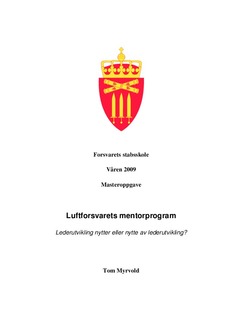Luftforsvarets mentorprogram: Lederutvikling nytter eller nytte av lederutvikling?
Master thesis
Permanent lenke
http://hdl.handle.net/11250/99966Utgivelsesdato
2009Metadata
Vis full innførselSamlinger
- Masteroppgaver [466]
Sammendrag
The purpose of this master’s thesis was to evaluate a top management development program within the Royal Norwegian Air Force (RNoAF). The objective was to examine the effects of transfer of learning after attending the program. The Learning Transfer System Inventory (LTSI) created by Holton, Bates & Ruona (2000) was translated and administered to 8 separate classes (n=57) completing the program since year 2000. Using principal component analysis, 13 out of 16 factors of the LTSI was replicated. On this basis, a higher order factor structure comprised of personal characteristics, motivation, work environment and ability, as determined through hierarchical regression analysis, was used to predict transfer of learning effects based on the program. The four higher order factors explained a total of 51% of the variance in transfer of learning. Participant motivation and ability explained most of the variance, whilst work environment to some extent was found to influence transfer of learning following the program. Intrinsic motivation is indicatively more important than extrinsic motivation, and both seem to be related to the participant’s perception of the program desig. Furthermore, the results indicate that the participants have sufficient resources to transfer learning, but are somewhat restricted in their opportunity to utilize what they have learned. The participants report few obstacles for transfer of learning in their respective organizations, but simultaneously indicate a lack of response from their work environments when transfer of learning is attempted. The latter seems to hinder transfer of learning within the program. Personal characteristics explored in this thesis were found to be of secondary influence only. Neither participant learner readiness, nor performance self-efficacy, seems to have a direct impact on transfer of learning. There was also found to be a positive relationship between time and transfer of learning. Results indicate that the longer since completing the program, the more transfer of learning is reported. This supports the assumption that transfer of learning within a top management development program is somewhat a ripening process. From a broader perspective, by defining and accurately measuring factors affecting transfer of learning, this thesis moved beyond the question of whether training works to why training works
